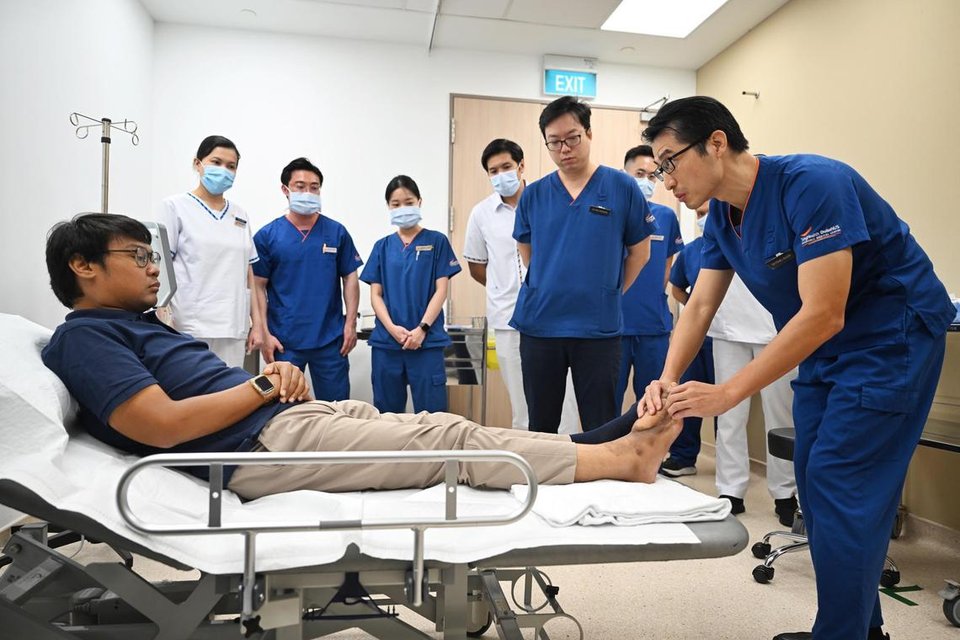Elderly urged to get 2nd Covid-19 booster jab to protect against severe illness

Published on
09 Jan 2023
Published by
The Straits Times
SINGAPORE – Although Covid-19 vaccines do not work as well in older people, a second booster dose does provide significantly more protection, according to several studies, including one done in Singapore.
The local study led by the Ministry of Health (MOH) found that people aged 80 and older who had taken their second booster shot were far better protected than those in the same age group who had only three mRNA shots.
They had less than half the risk of hospitalisation, and their risk of severe illness or death was about a third after the second booster vaccine compared with those with only one booster shot.
Today, only 61 per cent of seniors in this age group are “up to date” with their Covid-19 vaccination – meaning that their last booster was taken less than a year ago.
Associate Professor Hsu Li Yang, an infectious diseases expert at the National University of Singapore Saw Swee Hock School of Public Health, said protection against severe Covid-19 wanes slowly over time. Each booster dose helps to temporarily reverse that progression even as it also decreases the risk of infection in the short term.
“The elderly should most definitely get their second booster doses of the Covid-19 vaccine, as well as the third should the Expert Committee recommend it,” he said. Seniors who had been vaccinated early are already being asked to go for their third booster.
The study shared its data – which looked at 80,000 people aged 80 and older, half of whom had taken their second booster – in letters to journals such as The Lancet at the end of 2022.
However, the team looked at this group for only up to 60 days after their second boosters. Professor Leo Yee Sin, executive director of the National Centre for Infectious Diseases, said the study is not suggesting that seniors need boosters every two months.
“The best interval and constitution of vaccine composition are still under intense study,” she added.
At the end of 60 days, relative effectiveness was 55 per cent against hospitalisation and 63 per cent against severe illness where the patient might require oxygen, intensive care or even die. Protection against infection was only 22 per cent better after 60 days.
In real numbers, 252 people in the group with two boosters were hospitalised and 40 died – compared with 626 hospitalised and 115 deaths in the group with one booster shot.
MOH said the study is ongoing.
Professor Paul Tambyah, a senior infectious diseases consultant at the National University Hospital, said the study was to determine whether a second booster shot would provide any benefit to this group of seniors.
He said it was reassuring that the decline in efficacy was a gradual drop by the time the study ended.
Prof Leo noted that this group was studied as the majority of people here needing hospitalisation, or who had died, were older patients with chronic illnesses.
“Age is the most significant independent risk factor for severe illness that remains despite vaccination,” she said.
There are few studies on the effectiveness of Covid-19 vaccines for very old people, for whom vaccine protection is usually lower than that for younger adults.
An Italian study of people in the same age group suggested that over a four-month period, among those who had a second booster, 431 infections and 73 cases of severe illness were averted per 100,000 people.
The researchers suggested evaluating the benefit of a third booster shot four months after the second one, for people in this higher-risk group.
Data from MOH shows that only three in five people aged 50 and older have up-to-date vaccination. More than 90 per cent have the minimum protection – meaning they have had one booster shot.
For some, this was taken more than a year ago. In contrast, among people aged 12 to 49, 69 per cent to 81 per cent are up to date.
Prof Tambyah said: “Personally, I have advised seniors and others who are travelling or immunocompromised to ensure that they have had a fairly recent vaccination.”
But he added that there is not a lot of data on the long- or medium-term benefits of repeated vaccination if they are not at high risk.
On whether nasal vaccines, which are inhaled through the nose, would be easier on the elderly, Prof Tambyah said that although they are “tremendously attractive from a theoretical point of view”, so far they are “full of promise and potential but unfortunately they have not delivered meaningful results yet”.
Eligible individuals can walk into vaccination centres and joint testing and vaccination centres from Mondays to Saturdays without the need for an appointment. Polyclinics and public health preparedness clinics require an appointment, with the exception of seniors aged 80 and above for polyclinics.
Source: The Straits Times © Singapore Press Holdings Limited. Reproduced with permission.
ALL views, content, information and/or materials expressed / presented by any third party apart from Council For Third Age, belong strictly to such third party. Any such third party views, content, information and/or materials provided herein are for convenience and/or general information purposes only. Council For Third Age shall not be responsible nor liable for any injury, loss or damage whatsoever arising directly or indirectly howsoever in connection with or as a result of any person accessing or acting on any such views, content, information and/or materials. Such third party views, content, information and/or materials do not imply and shall not be construed as a representation, warranty, endorsement and/or verification by Council For Third Age in respect of such views, content, information and/or materials.







